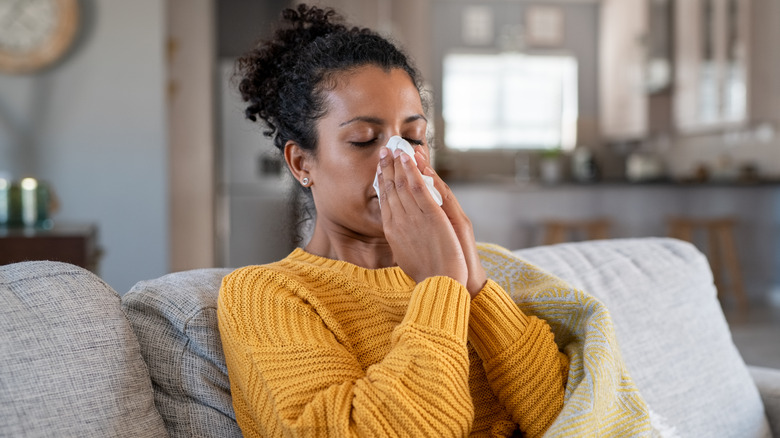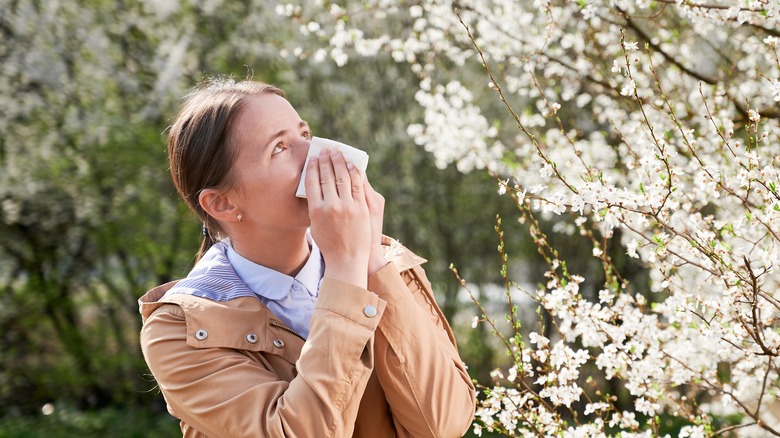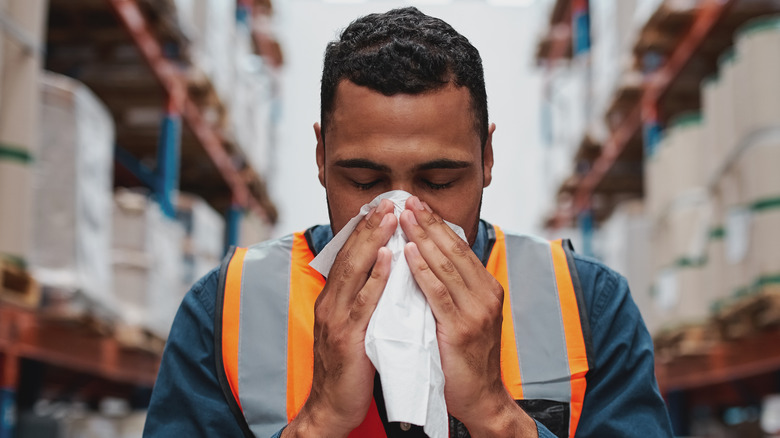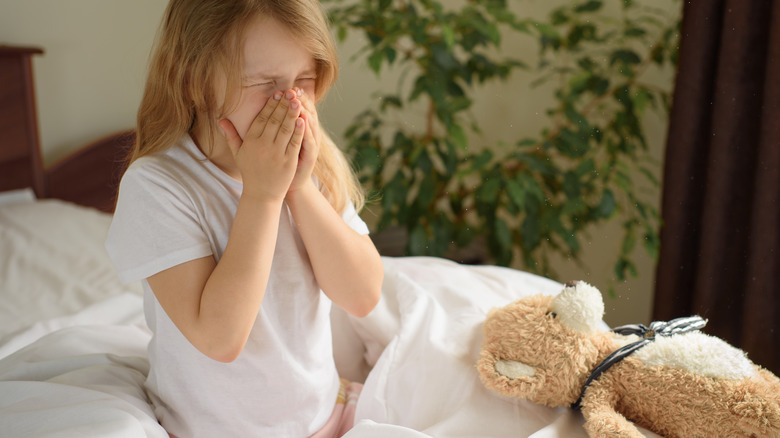How To Stop Sneezing So Much
Sneezing is a natural reflex of the body that helps you get rid of the irritants in your nasal passage such as dust particles, bacteria pollens, or dirt, explains Healthline. Before sneezing, you might experience a slight tickling in the nose. This happens when an irritant comes in contact with the nasal hairs, which are responsible for preventing these particles from going further into the body. As soon as the nasal hairs are triggered, they send a brain signal to initiate a sneeze and expel the irritant.
Sneezing is an interesting and powerful phenomenon. According to Flonase, one sneeze can produce approximately 40,000 droplets and is capable of spraying to a whopping five feet at around 100 miles per hour. Additionally, this reflex action is so strong that it can temporarily affect your heartbeat.
If you often have sneezing episodes, it may be caused by a response to your environment, like allergies, or you may have come down with the cold or flu. If sneezing is causing too much discomfort, there are ways to help prevent them.
Be aware of your triggers during seasonal changes
Being aware of your triggers can help you avoid sneezing episodes. Exposure to pollen during allergy season, particularly when spring flowers are blooming and pollination is in full swing, can put you at risk of allergies, warns WebMD. Pollen is like a foreign agent for your body. It triggers the defense mechanism, which releases chemicals called histamines into your blood. As a result, you might experience a sneeze, runny nose, and even watery eyes.
Nonetheless, there are a few practices to keep in mind in order to avoid the sniffles. Health experts at Cleveland Clinic suggest keeping your windows shut during the spring, summer, and fall seasons, as this is when pollen is at its greatest. The National Health Service (NHS) suggests avoiding hanging your clothes outside to dry, as pollen can get stuck to them, causing a reaction when you wear them. A 2021 study published in the Allergo Journal International also recommends wearing a mask when you go out to help prevent the pollen from entering the nasal passage.
Avoid environments with dust, dirt, or allergic materials
Similarly, you might want to steer clear of environments where there's a lot of allergic material around. For example, construction sites often have loads of dust, which can get into your system and cause sneezing (via the Times Herald-Record). Dust from construction regions may cause more detrimental allergic reactions than those triggered by animal hair or pollens, dermatologist of the Miami Skin Institute, Dr. Manjula Jegasothy, told the Times Herald-Record. "This is because construction dust is often composed of particles from many different sources present at the building site. Coupled together, they irritate the skin and nasal membranes," explains Dr. Jegasothy.
Likewise, woodworking or carpentry workshops have excess particles in the air that can trigger allergies, explains the Canadian Center for Occupational Health and Safety (CCOHS). The wood dust can lodge into your nose and throat, leading to coughing, sneezing, and itchy eyes. If you work in such environments, ensure you wear the proper equipment. Additionally, Helmkamp Construction suggests taking a shower as soon as you get home to eliminate allergenic material on the body.
Be careful with strong fragrances
While some may enjoy a nice spritz of perfume, it may cause others to have mild fragrance sensitivity, which can result in sneezing, according to Healthline. A 2019 survey published in Air Quality, Atmosphere, & Health, was conducted in the U.S., U.K., Sweden, and Australia. It revealed that 17.4% of the population was allergic to air fresheners, while 15.7% of them had an allergic reaction to just spending time in a room where scented household cleaning products were used. Most of these individuals experienced mucus production, respiratory problems, rashes, asthma, and even severe headaches. In fact, 9.5% of the participants involved in the study reported having missed work days or losing their job due to their severe allergies to the cleaning products used at their worksite.
Thus, if you work in an environment where there are a lot of fragrances, such as a perfume outlet or factory, you may want to get regular flu shots to boost your immune health, suggests Healthline. In addition, it's best to avoid crowded places where you may run into people who wear perfume. You can also inform your colleagues or workspace management about your fragrance allergies.
Make your bedroom allergy-proof
You can have items at home that make you sneeze as well, particularly in the bedroom (via WebMD). Hence, consider removing allergy triggers from your bedroom as some people have severe sneezing episodes, especially in the morning. Usually, the mattress, bedding, or blankets accumulate dust mites that may cause you to sniffle often. You can try washing your bedding thoroughly and decluttering your space so less dust settles. If there's an excess of dust mites on your mattress, consider vacuuming every day, as per Heveya. You can make the process even more effective by mixing together a few drops of essential oil with baking soda and applying it to your coil mattress. Leave it on for 15 minutes and then vacuum thoroughly. The mixture helps suck away all the dust mites. However, avoid trying the mixture on latex beds, as it can cause adverse effects.
Moreover, you can try investing in hypoallergenic bedding covers, such as pillow covers made of materials that repel dust mites and pet allergens (via Medical News Today). It's also good to pay attention to molds in your bedroom, as the spores they spread could enter your respiratory system and trigger sneezing (via Livescience).
Try some home remedies to stop sneezing
Although home remedies rarely guarantee results for everyone, you can try some of the most popular ones to stop continuous bouts of sneezing. For example, Healthline shares some quick tricks to stop sneezing include tickling the roof of your mouth using your tongue for at least five to 10 seconds or pressing your tongue against your front teeth to prevent sneezing. If that's not doing the trick, attempt pinching your nose right before the incoming sneeze. However, be sure to do this at the tip of the nostrils to close them. It can help alleviate the urge to sneeze.
You could try drinking chamomile tea to reduce episodes of sneezing, per Medical News Today. Chamomile tea is packed with antihistamine compounds that relieve allergy symptoms. Similarly, you can also set out to consume various citrus fruits, such as oranges and lemons, which have abundant vitamin C — a known compound with a remarkable effect on allergies.






